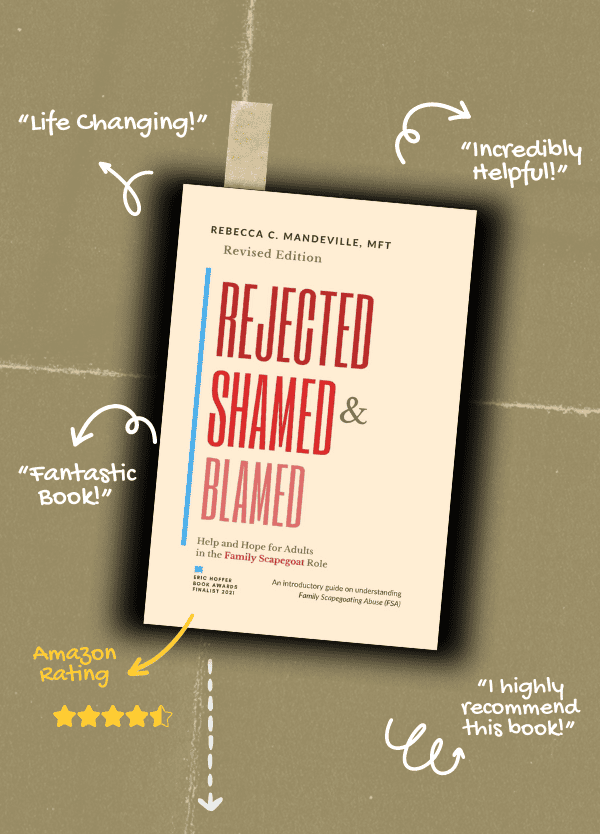Mother’s Day, a day dedicated to celebrating the women who brought us into the world, can be a complex and painful occasion for many.
On a day when expressions of gratitude and appreciation for mothers seem to be everywhere, for adult survivors of Family Scapegoating Abuse (FSA), it can serve as a reminder of the deep wounds inflicted by familial dynamics gone awry.
Why Mother’s Day Can Be Difficult for FSA Adult Survivors
Family scapegoating abuse is a pattern of behavior where one family member is unjustly targeted, blamed, and ostracized within the family unit. Often, this role falls upon a child, who becomes a human repository, of sorts, for the family’s dysfunction via the pathological Family Projective identification Process,
The targeted child (who, per my original FSA research is often the family Empath or Highly Sensitive Person aka HSP) will then unconsciously carry the burden of ‘blame and shame’ for the entire family’s problems, including intergenerational trauma that has not been consciously acknowledged or addressed within the family system.
Because of the insidious nature of this form of ‘invisible’ (psycho-emotional / systemic) abuse, FSA can have lasting effects on the targeted child / adult child’s mental, emotional, and even physical well-being, often life-long.
Hence, for adult survivors of FSA, Mother’s Day can evoke a range of conflicting emotions. On one hand, there may be a genuine desire to honor and acknowledge the role of their mother in their lives, despite the pain and trauma they endured.
They may also still long for the love and acceptance they never received, hoping that somehow, on this day, they will finally feel seen and valued by the person who society says was supposed to love, accept, and cherish them unconditionally.
An Understandable Longing for Genuine Motherly Love
In addition to the emotional toll experienced, Mother’s Day can also bring practical challenges for adult survivors of FSA. Navigating family gatherings and social expectations can be fraught with anxiety and discomfort. The pressure to put on a facade of happiness and harmony can be overwhelming, leading to further feelings of disconnection and alienation.
However, the reality often falls short of these expectations. Instead of warmth and appreciation, Mother’s Day may serve as a stark reminder of the fractured relationship between the FSA adult survivor and their mother.
The day may be filled with feelings of resentment, anger, and sadness (including disenfranchised grief) for the love and nurturing that was never received. It can highlight the painful contrast between the idealized image of motherhood and the harsh reality of the FSA adult survivor’s own experiences.
Mother’s Day can also be especially painful for FSA adult survivors who have had their children / adult children turned against them by one or both of their scapegoating parents, siblings, or extended family members. This is an extraordinarily difficult and devastating position to be in and deserves a dedicated article on its own, which I am currently working on.
Furthermore, societal expectations surrounding Mother’s Day can exacerbate these feelings of alienation and isolation. The commercialized portrayal of perfect families and unconditional maternal love can feel like a slap in the face to those who have never experienced it. The pressure to participate in the festivities and conform to societal norms can feel suffocating for survivors who are still grappling with the trauma of their past.
Sarah: A Case Study
For Sarah, Mother’s Day serves as a painful reminder of her fraught relationship with her mother. Instead of fond memories and warm sentiments, she is haunted by memories of mental and emotional abuse, including profound betrayal, invalidation, and psycho-emotional manipulation.
On Mother’s Day, societal expectations exacerbate Sarah’s internal turmoil. She feels pressure to participate in the cultural narrative of honoring and cherishing her mother, even though their relationship is fraught with pain and resentment. The dissonance between societal expectations and her lived reality further complicates her emotional experience.
Despite the challenges she faces, Sarah is committed to breaking the cycle of family scapegoating and reclaiming her sense of self-worth. Through therapy, self-reflection, and peer support in a community of other family abuse survivors she is learning to heal from the effects of feeling ‘rejected, shamed, and blamed’ in her family-of-origin. She is also setting boundaries and prioritizing her own emotional well-being, even if it means distancing herself from toxic family dynamics.
Sarah now views societal events like Mother’s Day as an opportunity for healing, growth, and the reclamation of her own personal narrative. Through self-awareness, resilience, and support, she is learning to rewrite her story and cultivate healthier, more fulfilling relationships that are reciprocal, supportive, and free from abuse. (Article continues below)

Learn More About Family Scapegoating Abuse (FSA)
Practical Considerations for FSA Adult Survivors on Mother’s Day
Dealing with all of the many complicated dynamics associated with FSA can be incredibly challenging, but there are several self-nurturing practices that can help adult survivors navigate dynamics that can feel overwhelming and complex.
For example, for many FSA adult survivors, buying and sending Mother’s Day cards can be fraught with anxiety, confusion, and frustration because the sentiments expressed in such cards can feel inauthentic (or like a flat-out lie).
In my FSA Recovery Coaching™ practice, I invite my clients to consider ways they can honor themselves and the truth of what happened to them in their families, even if they are also wanting to mark the occasion of Mother’s Day in some way for reasons that are meaningful to them. For example, they might send (or bring) flowers, but skip the card.
It’s also wise to listen to one’s nervous system when considering attending family events, especially if you suffer from complex trauma symptoms. If you are visiting family on Mother’s Day to be ‘dutiful’, what price might you be paying? What will the impact be on your mental and emotional (and even physical) health? How emotionally activating or ‘triggering’ might attending such an event be? Is it really worth it?
The Healing Power of Self-Nurturing Practices
I also like to encourage FSA adult survivors in my coaching practice to engage in self-nurturing practices on Mother’s Day as a means of giving to themselves what they did not receive growing up. Identifying ways of loving and nurturing oneself in concrete ways and committing to such practices can help to ease the pain and difficulty of feeling disconnected from all that Mother’s Day supposedly symbolizes.
Below are some examples of self-nurturing practices that can be helpful for FSA adult survivors struggling with Mother’s Day:
- Practicing self-compassion by being gentle with yourself while acknowledging that you are not to blame for the abuse you experienced is a self-nurturing thing to do. So is treating yourself with the same kindness and understanding that you would offer to a friend in a similar situation.
- You might also explore creative outlets as a means of self-nurturing on Mother’s Day. Engaging in creative activities such as writing, art, music, or dance can provide a healthy outlet for processing emotions and expressing yourself and is especially helpful if you suffer from symptoms of complex trauma that are activated by family obligations and events.
- Practices like mindfulness and meditation are also pathways that can help you cultivate inner peace, reduce stress, and develop greater self-awareness.
- Taking care of your physical health can have a positive impact on your emotional well-being. Make sure to prioritize activities like regular exercise, healthy eating, and adequate sleep.
- Educating yourself about FSA and its effects can help you better understand your experiences and feel less alone. You might want to start with my introductory book on FSA, Rejected, Shamed, and Blamed, to learn more about what my research revealed about this family scapegoating abuse dynamics and its long-term impact on adult survivors.
- Most importantly, I encourage you to acknowledge and celebrate your strengths. Remember that surviving FSA has made you incredibly resilient. Take pride in your strengths and accomplishments, as well as your efforts to heal and recover from the effects of FSA, no matter how small or insignificant they may at first seem.
You Are Not Alone
If you identify as being an adult survivor of FSA, recognizing and validating your painful experiences is the first step towards healing.
Above all, it’s crucial for survivors for FSA to remember that they are not alone in their struggles. There is a community of fellow survivors who understand and empathize with their experiences.
While Mother’s Day may always carry a bittersweet tinge for adult survivors of FSA, it’s important to recognize that despite the pain and complexity surrounding Mother’s Day for adult survivors of FSA, it can also be an opportunity for reflection, growth, and ultimately, reclaiming their sense of self-worth and autonomy.
Seeking support from therapists, support groups, or trusted friends can provide a safe space to process emotions and explore coping strategies. It’s important to remember that healing from FSA is a journey, and it’s okay to seek support and take things one step at a time. You deserve to live a life free from the burden of abuse, and these practices can help you move towards that goal.
If you identify as an adult survivor of FSA, what will you do to nurture and love yourself today?
